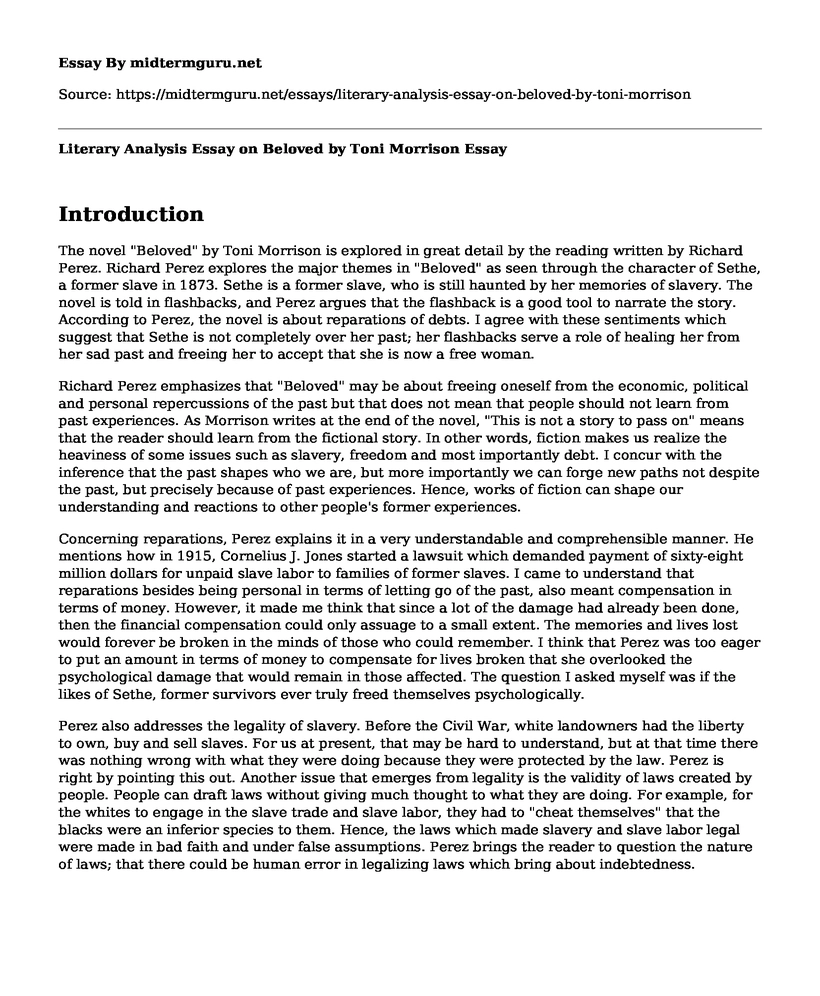Introduction
The novel "Beloved" by Toni Morrison is explored in great detail by the reading written by Richard Perez. Richard Perez explores the major themes in "Beloved" as seen through the character of Sethe, a former slave in 1873. Sethe is a former slave, who is still haunted by her memories of slavery. The novel is told in flashbacks, and Perez argues that the flashback is a good tool to narrate the story. According to Perez, the novel is about reparations of debts. I agree with these sentiments which suggest that Sethe is not completely over her past; her flashbacks serve a role of healing her from her sad past and freeing her to accept that she is now a free woman.
Richard Perez emphasizes that "Beloved" may be about freeing oneself from the economic, political and personal repercussions of the past but that does not mean that people should not learn from past experiences. As Morrison writes at the end of the novel, "This is not a story to pass on" means that the reader should learn from the fictional story. In other words, fiction makes us realize the heaviness of some issues such as slavery, freedom and most importantly debt. I concur with the inference that the past shapes who we are, but more importantly we can forge new paths not despite the past, but precisely because of past experiences. Hence, works of fiction can shape our understanding and reactions to other people's former experiences.
Concerning reparations, Perez explains it in a very understandable and comprehensible manner. He mentions how in 1915, Cornelius J. Jones started a lawsuit which demanded payment of sixty-eight million dollars for unpaid slave labor to families of former slaves. I came to understand that reparations besides being personal in terms of letting go of the past, also meant compensation in terms of money. However, it made me think that since a lot of the damage had already been done, then the financial compensation could only assuage to a small extent. The memories and lives lost would forever be broken in the minds of those who could remember. I think that Perez was too eager to put an amount in terms of money to compensate for lives broken that she overlooked the psychological damage that would remain in those affected. The question I asked myself was if the likes of Sethe, former survivors ever truly freed themselves psychologically.
Perez also addresses the legality of slavery. Before the Civil War, white landowners had the liberty to own, buy and sell slaves. For us at present, that may be hard to understand, but at that time there was nothing wrong with what they were doing because they were protected by the law. Perez is right by pointing this out. Another issue that emerges from legality is the validity of laws created by people. People can draft laws without giving much thought to what they are doing. For example, for the whites to engage in the slave trade and slave labor, they had to "cheat themselves" that the blacks were an inferior species to them. Hence, the laws which made slavery and slave labor legal were made in bad faith and under false assumptions. Perez brings the reader to question the nature of laws; that there could be human error in legalizing laws which bring about indebtedness.
Cite this page
Literary Analysis Essay on Beloved by Toni Morrison. (2022, Dec 27). Retrieved from https://midtermguru.com/essays/literary-analysis-essay-on-beloved-by-toni-morrison
If you are the original author of this essay and no longer wish to have it published on the midtermguru.com website, please click below to request its removal:
- The Biography of Harriet Jacobs Who Was Born as a Slave
- Literature Essay on the Use of Symbols by John Updike
- Essay on Heart of Darkness by Joseph Conrad
- Compare and Contrast Essay on Grendel and Beowulf in Terms of Kinds of Community They Create Around Themselves
- Literature Analysis Essay on Hamlet and Othello
- Literary Analysis Essay on 'Theme for English B' by Langston Hughes
- Critical Essay on Gender Roles in the Great Gatsby







